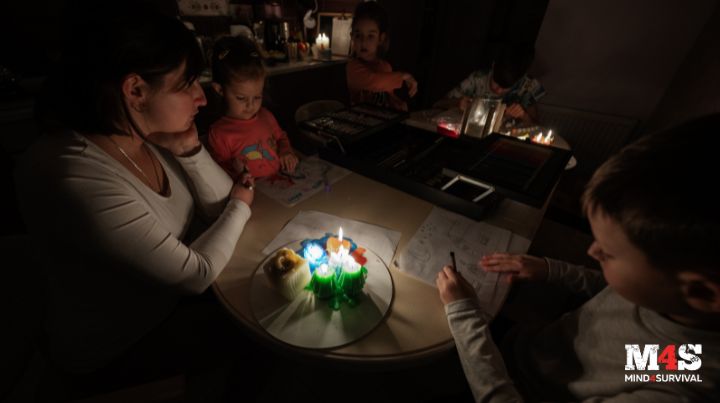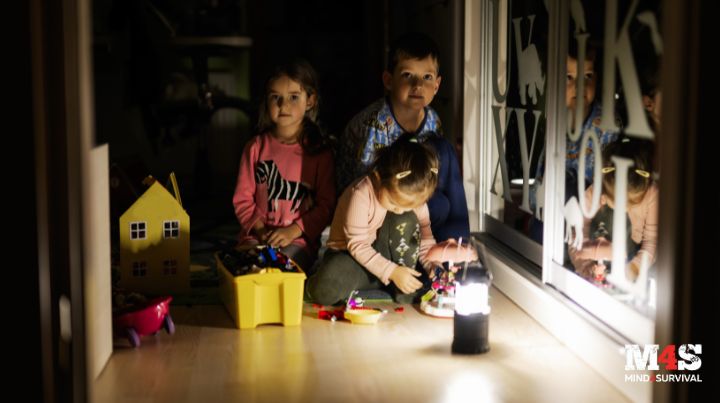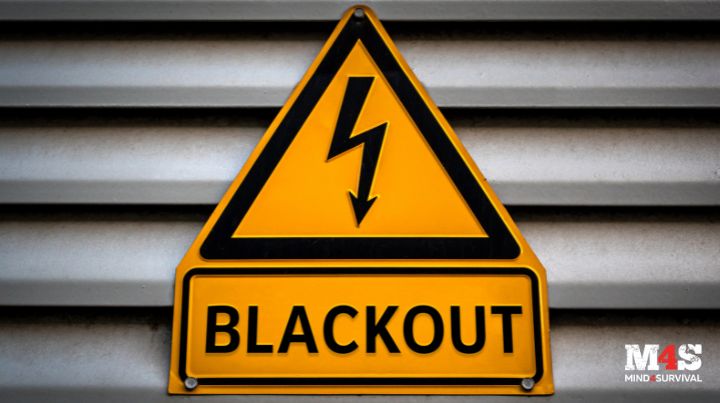Many people often take electricity and power outage preparedness for granted. However, power outages can occur unexpectedly, leaving us in the dark—sometimes quite literally. Being prepared for such situations is vital. This article provides practical tips on preparing for power outages and staying safe when the lights go out.
Understanding the Risks
Power outages can stem from various causes, such as severe weather, equipment failure, accidents, or even deliberate acts against the power grid. Knowing the potential risks in your area helps you prepare ahead of time for a grid failure. For instance, regions prone to hurricanes or ice storms might experience more frequent and prolonged outages. To help you understand the risks to your power grid, local power companies often have information on historical outage causes, which can help you know what to expect.
Before a Power Outage
Preparation before a power outage is crucial to minimize the impact on your daily life and ensure the safety of your household. By taking power outage preparedness ssteps to get ready ahead of time, you can avoid the panic and disorganization that many will face during a sudden power loss.
Think of this as an investment in resilience and the safety and stability of your family. Identify potential risks in your area, gather necessary supplies, and establish a plan for various scenarios. Viewing preparedness as an ongoing process rather than a one-time task will help you stay ready for unexpected outages and reduce the stress associated with them.
1. Create an Emergency Kit
An emergency kit is your first line of defense during a power outage, providing essential supplies and tools to handle immediate challenges. This kit ensures you and your family have the necessary resources to stay safe, comfortable, and informed when the lights go out. A well-prepared kit can make all the difference in maintaining a sense of normalcy and security during an unexpected outage. Here’s what to include in your emergency kit:
- Flashlights and Batteries: These provide essential light when the power goes out. Keep spare batteries on hand.
- Non-Perishable Food: Stock up on canned goods, dried fruits, and other foods that don’t require refrigeration.
- Water: Store at least one gallon of water per person per day for at least three days.
- First Aid Kit: A well-stocked first aid kit is crucial for any emergency.
- Manual Can Opener: You’ll need this to open canned food without electricity.
- Portable Power Banks: Keep your devices charged to maintain communication.
- Cash: ATMs and card readers may not work during a power outage.
- Multipurpose Tool: A versatile tool that can be handy for various tasks during an emergency.
2. Prepare Your Home
Ensuring your home is ready for power outages involves a variety of practical steps that can minimize the inconvenience and potential damage caused by sudden electricity loss. Preparing your home not only protects your belongings but also enhances your comfort and safety during extended outages. Your home can be better equipped to handle power outages with a few simple steps:
- Install Surge Protectors: Protect your electronics from power surges that can occur when power is restored.
- Backup Power Sources: Consider investing in a generator for more extended outages. Ensure it’s properly maintained and used safely. Solar-powered generators can be a quiet and eco-friendly option.
- Gas and Propane: Keep a supply of gas or propane for generators and outdoor grills. These can be used for cooking and heating. *Warning Note: Do not use your outdoor grill to heat your home!
- Insulation and Weatherproofing: Proper insulation and weatherproofing can help maintain your home’s temperature during a power outage, reducing the need for additional heating or cooling.
3. Communication Plans
Staying in touch with family and friends during a power outage is not just convenient. It can be crucial for ensuring everyone’s safety and well-being. Effective communication can help you coordinate efforts, share vital information, and provide reassurance during uncertain times. When the power is out, traditional communication methods might be disrupted, so having a solid plan in place can make all the difference. Here are some tips to help you maintain reliable communication during a power outage:
- Emergency Contacts: Keep a list of emergency contacts handy. Make sure everyone in your household knows where to find it.
- Communication Devices: Keep your cell phone and other devices fully charged. Consider having a backup battery or solar charger.
- Social Media and Apps: Use social media and apps to stay updated and inform others of your status. Neighborhood apps can be handy for local information and support.
- Landline Phone: If you have a landline phone that doesn’t require electricity, it can be a reliable backup communication method.
- Mobile Alerts: Sign up for mobile alerts from local authorities. These can provide real-time updates and instructions.
- Community Networks: Engage with neighbors and community groups for support and information sharing. Community centers might also have resources and updates.
- Battery-Powered Radio: Stay informed about the situation and weather updates. Hand crank radios are also an option here.

4. Food and Water Safety
During a power outage, one of the immediate concerns is the potential compromise of your food and water supplies. Without electricity, refrigerators and freezers can no longer keep food at safe temperatures, and water purification systems may be disrupted. This can lead to spoilage and contamination, posing serious health risks. To minimize these risks, it’s crucial to adopt specific measures to ensure the safety of your food and water. Follow these guidelines to maintain their safety and avoid health issues during and after a power outage:
- Keep Freezer and Refrigerator Closed: Keeping the doors closed helps maintain the temperature inside. A full freezer can keep food frozen for 48 hours.
- Check Temperatures: Discard any perishable food that has been above 40°F for more than two hours. Use a food thermometer to check the temperature of your refrigerated items.
- Water Purification: If your water supply is compromised, use purification tablets or boil water to make it safe for consumption.
- Coolers and Ice Packs: Have coolers and ice packs ready to store essential perishable items if the outage is prolonged.
5. Staying Warm or Cool
Depending on the season, power outages can pose significant challenges in maintaining a comfortable temperature in your home. Without heating in the winter or air conditioning in the summer, you may quickly find yourself in uncomfortable or even dangerous conditions. The key is to prepare in advance to mitigate these risks, ensuring that you and your family can stay safe and comfortable regardless of the weather outside.
- Winter Preparation: Stock up on blankets, warm clothing, and firewood. Avoid using gas stoves or ovens for heating, as this can be dangerous. Consider investing in a safe indoor heater that doesn’t require electricity.
- Summer Preparation: Use battery-operated fans and stay hydrated. Wear light clothing and try to stay in the shade. Close blinds and curtains to keep your home cool.
- Evacuation Plans: If the temperature becomes too extreme, have a plan to evacuate to a safe location.
6. Medical Needs
Those who rely on medical devices face additional challenges during a power outage. Power-dependent medical equipment, such as oxygen concentrators, ventilators, or dialysis machines, requires continuous electricity to operate safely. Ensuring these devices remain functional during an outage is crucial to the health and well-being of the individuals who depend on them. Planning ahead and taking necessary precautions can help mitigate risks and provide peace of mind during such emergencies. Some power outage preparations for medical needs are:
- Backup Batteries: Have backup batteries or a generator ready. Know how long each battery lasts and keep spares.
- Alternative Locations: Know the nearest locations that can power medical devices, such as hospitals. Check if local shelters can accommodate medical needs.
- Medications: Ensure an ample supply of medications and store them according to their requirements. Some medicines need to be refrigerated, so plan accordingly.
7. Entertainment and Comfort
Power outages can disrupt the normal flow of life, leading to boredom and heightened stress levels, especially when they last for an extended period. The sudden loss of electronic devices and the internet can make it challenging to find ways to pass the time. However, with a bit of preparation and creativity, you can turn this situation into an opportunity for family bonding and relaxation. By focusing on non-electronic entertainment options and maintaining a comfortable environment, you can reduce stress and keep everyone engaged and calm.
- Books and Games: Stock up on books, board games, and other non-electronic forms of entertainment. These can be a great way to pass the time and bond with family.
- Comfort Items: Have blankets, pillows, and other comfort items readily available. Familiar items can help reduce stress.
- Routine: Try to maintain a routine to keep a sense of normalcy. Regular activities, even without power, can help manage anxiety.

Immediate Actions During a Power Outage
When the power goes out, it can be an unsettling experience, especially if it happens unexpectedly. The sudden loss of electricity can disrupt daily routines, cause safety concerns, and create a sense of unease. However, by taking immediate and informed actions, you can ensure the safety and comfort of your household. The following steps will help you navigate the initial moments of a power outage with confidence and preparedness.
- Stay Calm: Panic can lead to accidents. Keep a clear head and follow your preparedness plan.
- Assess the Situation: Check with neighbors and monitor news reports to determine whether the outage is localized or widespread.
- Report the Outage: Contact your utility company to report the outage if it hasn’t already been reported.
- Unplug Appliances: During an outage, unplug appliances to prevent damage. Only leave essential appliances, like refrigerators, plugged in. This will help prevent problems should a power surge happen when the power returns.
- Use Flashlights: Use flashlights instead of candles to prevent fire hazards.
- Stay Indoors: Unless absolutely necessary, stay indoors to avoid potential hazards outside.
Safety Precautions
During a power outage, maintaining safety becomes paramount to avoid additional hazards and complications. The absence of electricity can lead to a variety of risks, such as fires, carbon monoxide poisoning, and security vulnerabilities. Preparing ahead of time can help mitigate these dangers and ensure the well-being of everyone in your household. Here are some precautions to take:
- Candles and Open Flames: Use battery-powered lights instead of candles to avoid fire hazards.
- Carbon Monoxide: Never use gas generators, grills, or other gasoline, propane, or charcoal-burning devices indoors. This can cause deadly carbon monoxide poisoning.
- Security: Be mindful of security during a power outage. Keep doors and windows locked, and use battery-operated security systems if available.
After the Power Outage
Restoring power is a relief, but it’s important to take certain steps to ensure everything is back to normal and to prepare for future outages. Taking the right actions can prevent damage, replenish supplies, and enhance your overall preparedness for next time. Here’s what you should do once the power is restored:
- Check Appliances: Plug in and check all appliances to ensure they work correctly. Look for any signs of damage before use.
- Restock Supplies: Replenish any supplies you used during the outage. This includes food, water, batteries, and other essentials.
- Review and Improve: Evaluate your preparedness plan and make improvements for the future. Discuss with your household what worked well and what needs adjustment.
- Health Precautions: Be aware of foodborne illnesses. If in doubt about food safety, it’s better to discard it.

The Bottom Line on Power Outage Preparedness
Power outages can happen unexpectedly, leaving us vulnerable and unprepared if we haven’t taken the necessary precautions. By following the practical tips outlined in this article, you can ensure that your household is ready to face the challenges that come with a sudden loss of electricity. Understanding the risks, preparing your home and emergency kits, and having a solid communication plan in place can significantly reduce the impact of power outages on your daily life.
Ensuring food and water safety, staying comfortable during extreme temperatures, and addressing medical needs are all crucial aspects of preparedness. Additionally, finding ways to stay entertained and maintaining safety throughout the outage are essential for keeping stress levels low and ensuring everyone’s well-being.
Once the power is restored, taking the right steps to check appliances, restock supplies, and review your preparedness plan will help you be even better prepared for future outages. By making power outage preparedness an ongoing process, you can turn what could be a chaotic situation into a manageable one, safeguarding your family’s safety and comfort.
How do you prepare for power outages? Have you experienced any significant outages? Share your thoughts and experiences in the comments below. Your insights could help others improve their own preparedness strategies.
Stay safe,

Read the full article here





